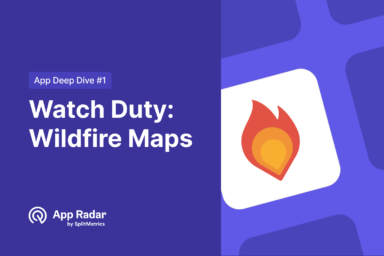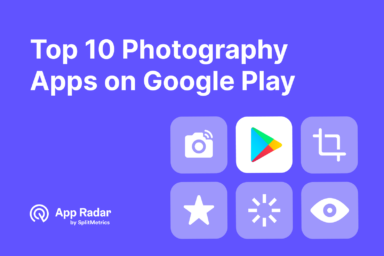12 Best Mobile Measurement Partners (MMPs) to Consider for Your Mobile App Attribution in 2025
A Mobile Measurement Partner (MMP) is a third-party platform that enables app marketers to accurately track, attribute, and analyze user activity. It measures key activites like user acquisition, engagement, and retention across all advertising sources to provide a complete performance picture for app campaigns.

MMPs provide a unified, real-time view of campaign performance by consolidating data from different channels. This unbiased attribution helps app marketers see which sources drive installs, in-app events, revenue and other metrics. MMP’s function is crucial for optimizing marketing spend, preventing fraud and complying with regulatory compliance.
Looking for an MMP and want to understand best tools and key aspects of each one? Keep reading to get answers.
How does an MMP work?
An MMP operates through a clear, multi-step process to ensure accurate mobile attribution and data analysis. The core mechanics of how MMPs work include:
- SDK integration – an MMP collects install and in-app event data after its Software Development Kit is integrated into the app.
- Attribution – it assigns credit for installs using device ID matching, probabilistic methods, and privacy-focused solutions like SKAdNetwork on iOS.
- Unified analytics – MMPs act as a single source of truth that provide clear comparison and help with strategic decisions based on consolidated data.
Why are MMPs essential for app marketers?
Mobile Measurement Partners are essential for app marketers because they provide the clarity and security needed to run effective app campaigns. Their core value is demonstrated in several key areas:
- Impartial measurement and unbiased attribution, which is a must for evaluating mobile marketing ROI and allocating budget efficiently
- They pull and consolidate data from all ad networks into a single dashboard to eliminate fragmentation and create actionable insights
- Most top MMPs include robust fraud detection tools to protect marketing budgets from invalid activity.
- They help marketers with privacy compliance and to navigate complex global privacy regulations like GDPR, CCPA, and Apple’s ATT framework.
- The real-time analytics of MMPs allow marketers to optimize campaigns, rapidly iterate and improve performance based on reliable data.
What are the best mobile measurement partners for 2025?
Below is the concise feature-by-feature breakdown of the top MMPs available in 2025. Each tool is listed by name and accompanied by a clear summary of its features, unique options, standout capabilities, and who it’s best suited for.
AppsFlyer

AppsFlyer is a global leader in mobile attribution and marketing analytics, renowned for its scalability, fraud prevention, and privacy-first features.
- Features & highlights:
- Multi-touch attribution across all channels and devices
- Real-time analytics dashboards and cohort reporting
- AI-driven fraud protection and anomaly detection
- SKAdNetwork support, Privacy Sandbox compatibility
- Cost aggregation, deep linking, raw data APIs, and customizable dashboards
- AI elements: AI is leveraged in fraud prevention and insights for campaign optimization.
- Best for: Enterprises, global apps, marketers requiring scalability and robust compliance.
- Notable clients: Walmart, HBO, Alibaba, Coca-Cola, The Very Group.
- Pricing: Free “Zero Plan” (12,000 conversions for the first year); Growth plan at $0.07/conversion after free quota; custom enterprise pricing with feature add-ons
Adjust

Adjust is a privacy-centric MMP with advanced fraud prevention, real-time analytics, and unlimited raw data access.
- Features & highlights:
- Full-funnel attribution (mobile, web, CTV)
- Real-time granular analytics and reporting
- Unlimited event measurement and raw data access
- AI-powered fraud protection and marketing automation
- Robust SKAdNetwork and ATT compliance
- AI elements: Automated fraud detection and predictive analytics.
- Best for: Large apps, regulated industries, privacy- or compliance-minded brands.
- Notable clients: Uber, Spotify, Zynga, N26, Lidl, Otto Group, REWE Group.
- Pricing: Custom and usage-based; details available by contacting sales
Singular

Singular provides unified analytics combining attribution, spend, and ROI for granular, cross-platform marketing insights.
- Features & highlights:
- Multi-touch, cross-device attribution
- Cost aggregation and ROI dashboards
- Granular creative analytics
- Fraud prevention and SKAdNetwork cohort prediction
- No-code ETL for data exports
- AI elements: AI leveraged for SKAdNetwork cohort prediction and campaign optimization.
- Best for: Advanced marketers, analysts, and multi-channel growth teams.
- Notable clients: Lyft, Airbnb, Yelp, TikTok (official partner).
- Pricing: Free for 15,000 conversions; $0.05/conversion with technical support (Growth plan); custom enterprise options
Kochava

Kochava excels in cross-device and omnichannel attribution, including CTV/OTT, with fraud prevention and advanced analytics.
- Features & highlights:
- Deterministic and probabilistic attribution
- Real-time cohorting, analytics, and smart links
- Data marketplace and API integrations
- Fraud protection
- AI elements: Utilizes AI for fraud detection and analytics optimization.
- Best for: Brands with multi-platform needs and complex data requirements.
- Notable clients: Paramount+, Spotify, DraftKings.
- Pricing: Free tier up to 10,000 conversions; paid plans from $500/month; enterprise quotes.
Google Firebase

Firebase is Google’s free analytics and attribution suite with deep integration into the Google tech stack.
- Features & highlights:
- Unlimited event tracking and user properties
- Real-time dashboard, BigQuery data export
- Integrated with Google Ads, AdMob, and A/B testing
- In-app messaging, push notifications
- AI elements: Machine learning used in Google Analytics insights and predictions.
- Best for: Indie apps, startups, products within Google’s ecosystem.
- Notable clients: eBay Motors, Gameloft, Halfbrick.
- Pricing: Core product is free with generous quotas; pay-as-you-go for expanded BigQuery exports.
Branch

Branch is the industry’s deep-linking leader, specializing in seamless web-to-app experiences and cross-device attribution.
- Features & highlights:
- Deep contextual and cross-platform linking
- Accurate mobile/web/CTV attribution
- Smart banners, link-level analytics
- Influencer tracking and custom integrations
- AI elements: Not explicitly stated in current public features.
- Best for: E-commerce, DTC, and apps needing advanced linking and omnichannel tracking.
- Notable clients: Airbnb, Ticketmaster, BuzzFeed.
- Pricing: Free plan available; advanced and high-volume custom quotes.
Localytics

Localytics fuses analytics, attribution, and engagement automation for customer-centric campaigns.
- Features & highlights:
- Segmentation, A/B testing, event analytics
- Push, in-app, and geo-triggered messaging
- Predictive analytics
- AI elements: Predictive analytics for user behavior.
- Best for: Apps focused on retention, lifecycle marketing, or CRM.
- Notable clients: ESPN, eBay, The New York Times.
- Pricing: Custom/annual contracts; starter pricing estimated at $10,000/year.
Tenjin

Tenjin is an affordable attribution and analytics tailored for mobile game studios and startups.
- Features & highlights:
- Attribution and SKAdNetwork reporting
- Ad spend, LTV analytics, and data export pipelines
- Integration with major ad networks
- AI elements: Not explicitly advertised.
- Best for: Gaming companies and early-stage mobile developers.
- Notable clients: Voodoo, Ruby Games.
- Pricing: Free up to 2,000 attributions/month; paid plans from $300/month.
Adtriba

Adtriba is predictive, AI-powered multi-channel attribution for strategic marketers. It was acquired by Funnel in 2024.
- Features & highlights:
- Cross-channel marketing mix modeling
- Predictive analytics, automated reporting
- Budget Optimization
- AI elements: AI is used for predictive analytics and modeling.
- Best for: Marketers seeking data-driven, cross-channel campaign insights.
- Notable clients: Confirmed client names are not publicly available.
- Pricing: Available on request only.
Dreamdata

Dreamdata is a B2B multi-touch revenue attribution platform for mapping full customer journeys..
- Features & highlights:
- Advanced B2B funnel analytics and ROI tracking
- Custom reporting tools and data exports
- AI elements: Employs AI for attribution modeling and analysis.
- Best for: B2B SaaS and business apps.
- Notable clients: Trustpilot, Pleo (confirmed on website).
- Pricing: Premium; starts at $1,495/month.
Airbridge

Airbridge is a privacy-forward, modern platform for cross-platform and web/mobile attribution; especially strong in APAC markets.
- Features & highlights:
- ROAS measurement, deep privacy/fraud controls
- Cross-platform web/mobile measurement
- AI elements: Uses AI/ML for fraud prevention.
- Best for: Brands with strong presence in APAC, cross-platform marketers.
- Notable clients: GS Retail, Burger King Korea.
- Pricing: Available on request.
AppMetrica

AppMetrica is advanced analytics and attribution platform with high quotas for tracking and real-time analytics.
- Features & highlights:
- Unlimited event tracking (up to 100M events on free tier)
- Crash reporting, A/B testing, audience segmentation
- AI elements: Not prominently advertised.
- Best for: Apps that need flexible and high-volume analytics.
- Notable clients: Predominantly used in CIS/Eastern Europe.
- Pricing: Free up to 100M events; Pro plan from $3,000/month.
Which MMP is the best?
There is no one-size-fits-all answer and the final choice of MMP depends on your app market, budget, number of users, internal support and other factors relevant for your business.
Based on our experience, here is a quick overview of each MMP, key strenghts and what is it best for.
| MMP | Notable Strengths | Best For |
|---|---|---|
| AppsFlyer | Enterprise-grade attribution, AI insights, privacy-focused, broad integrations | Enterprise & large-scale marketing |
| Adjust | Superior privacy, server infrastructure, fraud prevention, SKAdNetwork support | Privacy/regulatory focus; global apps |
| Singular | Unified analytics (spend + attribution), creative analytics, highly rated | Multi-channel ROI & creative optimization |
| Branch | Deep linking, web-to-app journeys, cross-channel | E-commerce, DTC, omnichannel funnels |
| Kochava | Omnichannel, CTV/OTT support, advanced analytics | Brands with multi-platform needs |
| Google Firebase | Seamless with Google Ads, free tier, vast data tools | Early-stage/indie apps, Google stack |
| Tenjin | Value for money, hyper-casual/gaming focus | Gaming, startups on a budget |
| Localytics | Marketing automation + attribution | CRM-heavy apps, user engagement |
| Dreamdata | B2B revenue/funnel attribution | B2B, deep funnel analytics |
| Adtriba | AI-powered, cross-channel, predictive analytics | Unbiased, strategic decision makers |
| Airbridge | Multi-platform, Korean/global expertise | Cross-platform marketers, APAC brands |
| AppMetrica | Real-time analytics, high event limits | Unlimited tracking, flexible analysis |
How does MMP pricing work?
MMPs are structured around several models designed to fit different app sizes and data needs. Costs are typically influenced by event volume, feature access, data granularity, and contract terms.
Here are the most common questions you should have answered.
Do any MMPs offer free plans?
Yes, several MMPs provide free entry-level plans that are ideal for new apps, MVPs, or testing attribution features. These plans, such as AppsFlyer’s Zero Plan or offerings from Tenjin, typically cover a limited number of conversions or events before requiring an upgrade to a paid tier.
What is usage-based billing for MMPs?
Usage-based billing is the most common MMP pricing model, where costs scale directly with app activity. Leading providers like AppsFlyer, Kochava, and Singular charge based on the volume of events tracked, such as app installs, specific attributions, or custom in-app events logged by the user.
Are there monthly minimum fees for MMPs?
Some MMP platforms require a minimum monthly subscription fee for access to premium features, even if event volume is low. This model, used by providers like Kochava and Tenjin, often bundles a specific range of usage and ensures a baseline level of service and support.
Do MMPs offer custom enterprise pricing?
Custom enterprise pricing is a tailored quote created for high-volume or high-needs clients. MMPs like Adjust and AppsFlyer develop these plans based on factors like app size, specific data requirements, the number of integrations needed, and the expected level of customer support.
How do features affect MMP pricing?
Advanced features directly impact the overall cost of an MMP subscription. Capabilities such as real-time data exports, sophisticated fraud protection suites, or creative analytics are often reserved for higher pricing tiers or are sold separately as paid add-ons to a base plan.
Does accessing raw data cost extra?
Accessing raw data pipelines and unlimited historical data often incurs extra fees in an MMP pricing structure. This granular level of data access is important for advanced analytics teams who need to perform deep-dive analysis and providers typically charge a premium for this capability.
What are other common MMP costs?
Beyond standard subscriptions, you may encounter other costs associated with MMP services. Be sure to confirm these potential fees when evaluating platforms:
- Paid Trials: Some MMPs offer paid proof-of-concept (POC) periods for enterprise buyers to validate the platform.
- Onboarding Fees: Enterprise-level contracts may include mandatory fees for setup and team onboarding.
- Annual Contracts: Higher-level or custom contracts often require an annual commitment rather than a month-to-month agreement.
MMP features feature lists change fast, especially as AI features are growing rapidly – if you plan to buy the attribution tool, you should confirm the specifics with vendors.
What should you consider before choosing an MMP?
Choosing an MMP requires a strategic evaluation of your technical, business and compliance needs. Key considerations range from your app’s current scale and data requirements to the platform’s integration capabilities, support structure, and overall market reputation. A thorough review ensures you select a partner that aligns with your long-term growth goals.
Make sure to check the questions below, as they will guide you during the research phase.
Why is app scale important for choosing an MMP?
Your app’s current and anticipated scale is a critical factor because you must choose a solution that scales affordably with your growth. Assess your present install and event volume, but also forecast future needs to ensure the MMP pricing model will not become prohibitively expensive as your user base expands.
How do data export needs affect your MMP choice?
Your data export needs directly impact both the price and platform choice for an MMP. You must determine if your team requires real-time, raw event or campaign data for deep analysis. Access to granular data pipelines is often a premium feature that not all providers offer in their standard tiers.
What fraud and privacy features should you evaluate?
You should evaluate each MMP’s approach to privacy compliance and fraud protection. Assess their tools for adhering to regulations like GDPR, CCPA, and Apple’s ATT framework. Additionally, determine if advanced fraud prevention is a critical requirement for your industry vertical to protect your marketing budget.
Why are integrations a critical factor?
Integrations are critical because your MMP must seamlessly connect with your existing marketing and analytics stack. Check for direct support for your preferred ad networks, CRM, and business intelligence platforms to ensure cohesive cross-channel campaign measurement, including web, mobile, CTV, and offline channels.
What level of support should you look for?
Enterprises should consider the level and speed of support offered by the MMP. This includes evaluating Service Level Agreements (SLAs), the quality of the onboarding process, and whether you will have access to dedicated representatives for timely and effective technical assistance.
How does geography influence your MMP selection?
Geography is a key consideration if you operate globally or in data-restricted regions like China, Korea, or the EU. Ensure the MMP has the necessary server infrastructure and compliance coverage in those locales to meet local data residency and privacy laws without compromising performance.
What should you look for in MMP analytics and reporting?
When evaluating app analytics, review how granular and customizable the MMP’s reporting is. Look for the ability to conduct detailed analysis on specific segments, user cohorts, and multi-touch attribution paths. This depth is essential for gaining actionable insights from your marketing data.
How should platform strengths and reputation guide your decision?
You should align an MMP’s proven strengths with your specific use case, as some platforms excel in gaming, e-commerce, or B2B. Supplement this by checking recent peer reviews on sites like G2 or Gartner for feedback on platform reliability, support quality, and overall ROI.

Latest Posts


